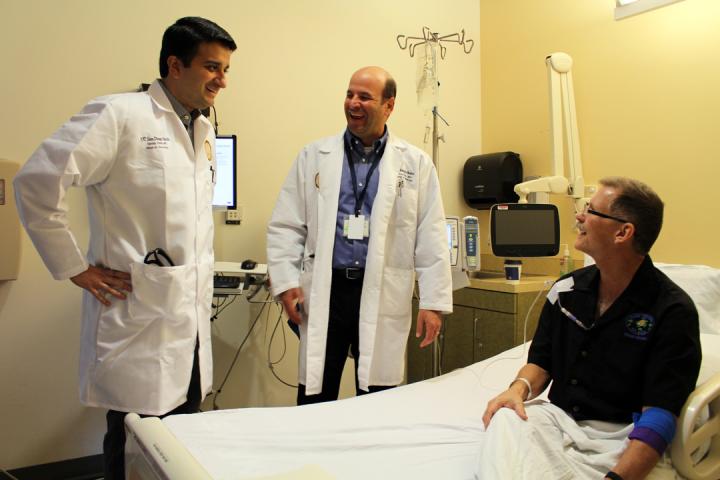Fate Therapeutics, in collaboration with UC San Diego researcher, developed first off-the-shelf immunotherapy from human induced pluripotent stem cells that is now in clinical trials

Credit: UC San Diego Health
After 10 years in remission, Derek Ruff’s cancer returned, this time as stage IV colon cancer. Despite aggressive rounds of chemotherapy, palliative radiotherapy and immunotherapy, his disease progressed. In February 2019, as part of a phase I clinical trial at Moores Cancer Center at UC San Diego Health, Ruff became the first patient in the world to be treated for cancer with a human-induced pluripotent stem cell (iPSC)-derived cell therapy called FT500.
“This is a landmark accomplishment for the field of stem cell-based medicine and cancer immunotherapy. This clinical trial represents the first use of cells produced from human induced pluripotent stem cells to better treat and fight cancer,” said Dan Kaufman, MD, PhD, professor of medicine in the Division of Regenerative Medicine and director of cell therapy at University of California San Diego School of Medicine.
“This is a culmination of 15 years of work. My lab was the first to produce natural killer cells from human pluripotent stem cells. Together with Fate Therapeutics, we’ve been able to show in preclinical research that this new strategy to produce pluripotent stem cell-derived natural killer cells can effectively kill cancer cells in cell culture and in mouse models.”
The off-the-shelf, iPSC-derived natural killer (NK) cell cancer immunotherapy received U.S. Food and Drug Administration approval to move into clinical trials in November 2018. Kaufman has been collaborating with Fate Therapeutics over the past four years to bring iPSC-derived NK cells to patients with cancer.
NK cells are specialized immune cells that are very potent at killing cancer cells. While NK cells can be isolated from the blood of donors or patients, this trial uses NK cells entirely produced in the lab from human iPSCs. Since human iPSCs possess the unique dual properties of unlimited self-renewal and differentiation potential into all cell types of the body, these cells can be used as starting material to mass produce NK cells at significant scale in a cost-effective manner.
Work in Kaufman’s lab, in collaboration with Fate and investigators at the University of Minnesota, defined conditions to efficiently produce NK cells at a scale suitable for clinical use. Since FT500 does not need to be matched to a patient like other T-cell therapies, researchers say FT500 can be administered in the outpatient setting as an “off-the-shelf” cell product, reducing the time and resources needed to treat patients.
The FT500 clinical trial is a two-arm study with up to 64 patients for the treatment of advanced solid tumors. It is designed to assess the safety and effectiveness of multiple doses of FT500 administered over multiple cycles as a monotherapy and as a combination treatment with one of three checkpoint inhibitor-based immunotherapies — nivolumab, pembrolizumab or atezolizumab — in patients where previous treatments have not worked or who have confirmed disease progression on checkpoint inhibitor therapy.
Ruff said he was a bit apprehensive at first about being the first patient in a new therapy, but is now enthusiastic.
“Everyone is excited and optimistic about this trial and it spilled over to us,” said Ruff nodding to his wife from his bed at Moores Cancer Center, San Diego’s only National Cancer Institute-designated Comprehensive Cancer Center. “Coming to a NCI cancer center means a lot to me. My options aren’t otherwise good. Some people may not opt for a clinical trial, but for me, I want a chance at a cure.”
Sandip Patel, MD, principal investigator for the FT500 trial at Moores Cancer Center and lead physician for Ruff’s NK cell therapy treatment, is excited by the prospect of cell-based immunotherapy in solid tumors.
“We are interested in expanding our armamentarium of immune cell types we target in solid tumors, which to date have mainly been T-cell directed therapies, and expanding to other cell types, such as natural killer cells, which may have unique advantages in treating certain cancer types,” said Patel, who specializes in cancer immunotherapy and early phase clinical trials. “The ability to work on a truly novel therapy with an innovative local San Diego company such as Fate Therapeutics and with collaborators such as Dan Kaufman at UC San Diego is particularly exciting.”
Kaufman began focusing on NK cells while working at the University of Minnesota. His original goal was to make early human iPSCs for use in blood and marrow transplant as a supplement or substitute for donor cells. As the cancer field grew, it spurred his interest into moving into a cell therapy application.
The advancement of FT500 into clinical investigation is a result of a collaboration between Kaufman and his colleague Jeffrey S. Miller, MD, of the University of Minnesota, with Fate Therapeutics to develop FT500 along with several other iPSC-derived NK cell product candidates.
“It’s really exciting to participate in the clinical launch of this first iPSC-derived cell product, and this approach really represents a new era for patients seeking cell-based immunotherapies. There are numerous advantages associated with using iPSCs rather than relying on an individualized approach, which requires repeatedly sourcing cells from patients and donors,” said Kaufman. “We are continuing to collaborate with Fate Therapeutics to develop additional versions of iPSC-derived cancer immunotherapies, including the first engineered iPSC-derived product candidates to move into clinical testing later in 2019.”
For now, Ruff, Patel and the rest of the team will wait patiently to see if fate will intervene and halt the progression of his cancer.
###
For more information about the clinical trial: https:/
Disclosure: Kaufman consults with and receives funding from Fate Therapeutics. Dr. Kaufman serves as a scientific advisor, received income, stock options and royalties.
Media Contact
Yadira Galindo
[email protected]




